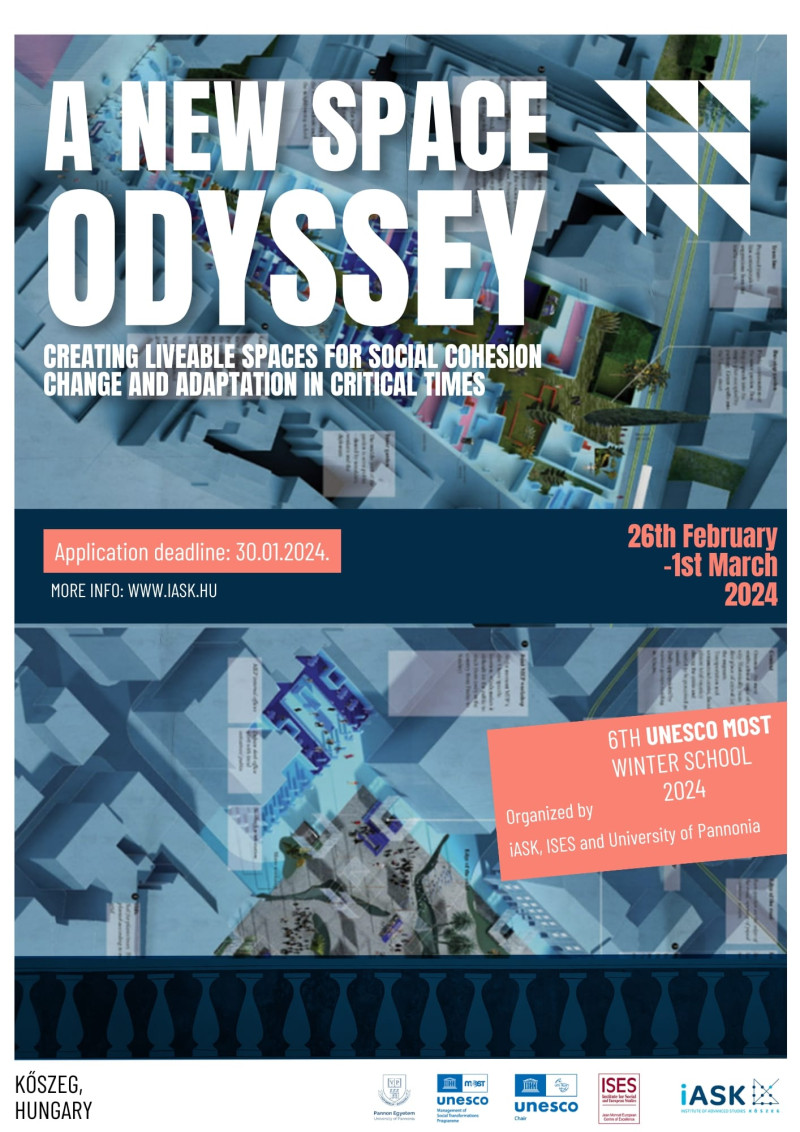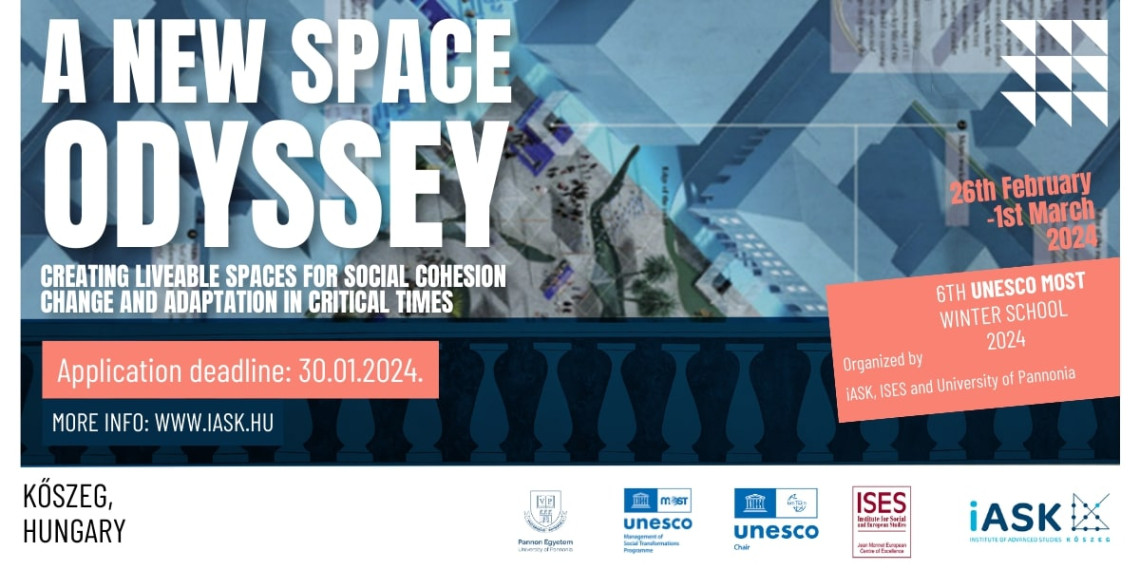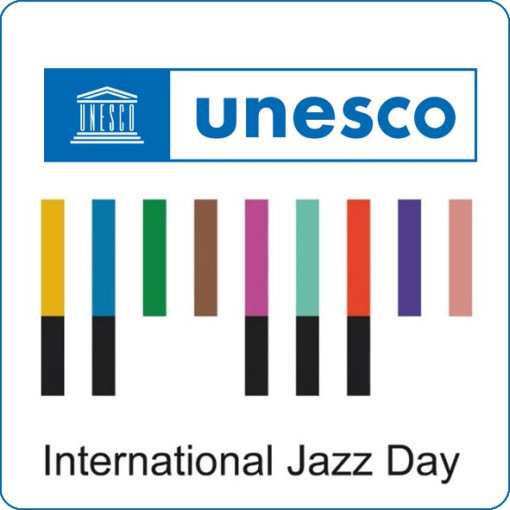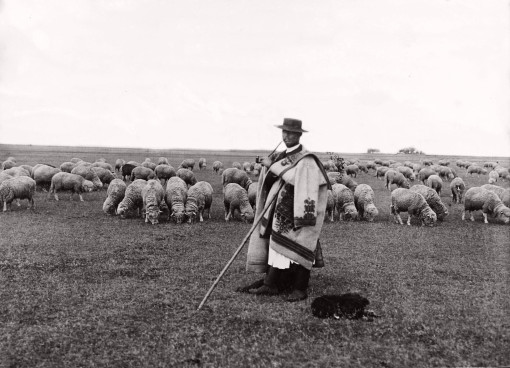6th UNESCO Most Winter School
A New Space Odyssey: Creating Livable Spaces for Social cohesion, Change and Adaptation in Critical Times
26th February – 1st March 2024 (Kőszeg, Hungary)
Organized by iASK in cooperation with the UNESCO Chair for Cultural Heritage Management and Sustainability, Institute of Advanced Studies Kőszeg (iASK) and the University of Pannonia

From ancient amphitheaters and agora to modern-day art galleries, co-working spaces, and online communities, social, cultural and creative spaces have played a pivotal role in facilitating human expression and interaction. Always adapting to the needs of society, they have served as crucibles where individuals come together to explore, create, and celebrate the richness of culture, creativity, and social connections. Thus, they have been intertwined by technological and economic changes. While they encompass a diverse array of physical and virtual environments, their shared objective is to nurture a sense of belonging, preserve and manage tangible and intangible cultural heritage, encourage innovation, and promote social change.
Social spaces serve as vital hubs for interpersonal connections and community building. Parks, cafes, community centers, and digital platforms provide venues where people gather to converse, form relationships, and create a sense of shared identity. These spaces facilitate not only social interaction but also political activism and the exchange of ideas, contributing to the formation of public spheres and the vitality of democracy. Cultural spaces encompass museums, theaters, libraries, and other institutions that preserve, present, and interpret culture, history, and the arts. These spaces act as stewards of heritage, providing opportunities for education and cultural enrichment. Furthermore, they contribute to the diversity and pluralism of societies, fostering an appreciation of different worldviews and traditions. Creative spaces, such as art studios, design workshops, and innovation hubs, are hotbeds for human ingenuity. These spaces encourage experimentation, collaboration, and the development of novel ideas. The innovative output of creative spaces drives economic growth, shapes industries, and adds vibrancy to communities. They also serve as platforms for artists and entrepreneurs to engage with the public, enhancing the accessibility of culture and creativity.
The synergy between these spaces is often underestimated. Cultural spaces can inspire creativity by exposing individuals to diverse artistic expressions. Likewise, creative spaces can promote cultural understanding by engaging artists and innovators from various backgrounds. Social spaces often serve as bridges between cultural and creative realms, facilitating the exchange of ideas, skills, and resources. These spaces face a host of challenges, including financial constraints, accessibility issues, and the need to adapt to evolving technological landscapes. However, they also represent opportunities for fostering inclusivity, innovation, and social change. Collaborative efforts between the public and private sectors, along with community involvement, can help address these challenges. By recognizing the interconnections and shared objectives of these spaces, we can better appreciate their profound impact on our identity, diversity, and social cohesion. As we navigate the complexities of the modern world, these spaces continue to evolve, adapt, and remain indispensable to our collective experience.
The 6th UNESCO MOST Winter School offers insight into the processes and interactions among different spaces, the social contexts they grow out of and construct, the values they convey, and the memories they are filled. The scope will move from the general global arena to the smallest local contexts. Panels focus on cultural institutions as repositories of great works of art, heritage items and knowledge centres, well as spaces of microheritage. We ask how they can promote shared values and the reworking of historical traumas and cultivate collective albeit diverse identities. We will tackle the challenges and possibilities for social spaces, and free creative spaces where artistic creativity and communal activities regenerate social cohesion. We also ask how our built environment can contribute to an enjoyable quality of life for individuals, and how we can use different methodologies to design and create spaces where citizens feel comfortable and at home.
The 6th UNESCO MOST Winter School, organised by iASK, ISES and University of Pannonia, will take place from the 26th February to 1st March 2024 in Kőszeg (Hungary). We welcome applications from master and doctoral students, junior and senior scholars, from the fields of arts, architecture, engineering, design, and all disciplines of humanities and social sciences, especially cultural studies, history, social psychology, spatial and regional sciences. We also welcome professionals and activists from governmental and non-governmental organisations.
Each year, the UNESCO MOST Winter School attracts top scholars from across Europe and the world, fostering education for the future, unorthodox thinking, and the dynamic exchange of ideas through transdisciplinary and transcultural dialogue. The discussions at the 6th UNESCO MOST Winter School will address following topics:
● Communities in times of peace and war
● Urban and rural spaces burdened by memory and liberated by art
● From formal institutions of culture to informal micro-sites of heritage
● Placemaking, Place branding and contemporary social design
● Peace and security and belonging to a community in times of war and conflict
● Communities of Care and Solidarity: how well-being is to be achieved
● Community building through arts and culture
● Emotional Mapping for liveable spaces
● Social innovation in the face of growing inequalities: creating accessible and free; spaces for diverse social groups and individuals
● Connecting ‘outside’ and ‘inside’ in spaces and their inhabitants
ADMISSION &FEES
PACKAGE A
The full fee is 350€ and it includes the following:
- Registration fee
- 5-day catering (lunch + coffee and refreshments)
- Free use of iASK facilities (including the library)
- Admission to cultural events
- Hotel accommodation in Kőszeg, Hotel Harangtorony http://harangtoronyszallo.hu
- Double room with breakfast
PACKAGE B
The full fee is 420€ and it includes the following:
- Registration fee
- 5-day catering (lunch + coffee and refreshments)
- Free use of iASK facilities (including the library)
- Admission to cultural events
- Hotel accommodation in Kőszeg, Hotel Harangtorony http://harangtoronyszallo.hu
- Single room with breakfast
PACKAGE C
The full fee is 370€ and it includes the following:
- Registration fee
- 5-day catering (lunch + coffee and refreshments)
- Free use of iASK facilities (including the library)
- Admission to cultural events
- Hotel accommodation in Kőszeg, Hotel Írottkő https://www.irottko.hu
- Double room with breakfast
PACKAGE D
The full fee is 460€ and it includes the following:
- Registration fee
- 5-day catering (lunch + coffee and refreshments)
- Free use of iASK facilities (including the library)
- Admission to cultural events
- Hotel accommodation in Koszeg, Hotel Írottkő https://www.irottko.hu
- Double room with breakfast
Day Pass
You can purchase a single-day pass or pay for as many days you wish to attend.
The price of the daily pass is 50 € We are unable to issue certificates to those who do not complete the full 6-day program.
Online participants
The registration fee for online participants is 100 €. We will issue the certificates to those who complete the full 6-day program. (Day Pass-20 €)
Application
The application process has 2 steps:
Step 1: Applicants send the following application documents to isu@iask.hu
The deadline for applications: 30 January 2024
·A completed Application Form downloadable at https://forms.office.com/e/rWgknEsDhF?origin=lprLink
·CV
Step 2: Having been registered, applicants receive payment guidelines for the registration fee
The deadline for payment: 9 February 2024
Eligibility
Advanced MA and PhD students and young researchers, as well as social entrepreneurs, who have a keen academic or professional interest in the topics.
SERVICE &FACILITIES
Institute of Advanced Studies Kőszeg features premium research facilities located in breathtaking historic buildings. We have a newly refurbished library located in the heart of the city at Jurisics Square along with three breath-taking office buildings: Europe House, Festetics Palace and Szemzo House in the tranquil Chernel Street which connects the stunning Sacred Heart church and the famous Jurisics castle. The Institute also services the premisses of the iconic Zwinger tower dating from the 13th century where we will host the 6th UNESCO Most Winter School. Our Synergy Campus with state-of-the-art labs is currently under construction. During your stay, you will have exclusive access to our premium facilities, including the library where you will be able to print and download books and articles from subscription-based journals and digital archives. You will also be able to enjoy coffee and refreshments in all 5 buildings located in the centre of the city. iASK is collaborating with the University of Pannonia, offering an MA program in International Relations. We also offer research fellowships on a rolling basis.
For more information, please visit the website of the Institute of Advanced Studies Kőszeg (iASK).


